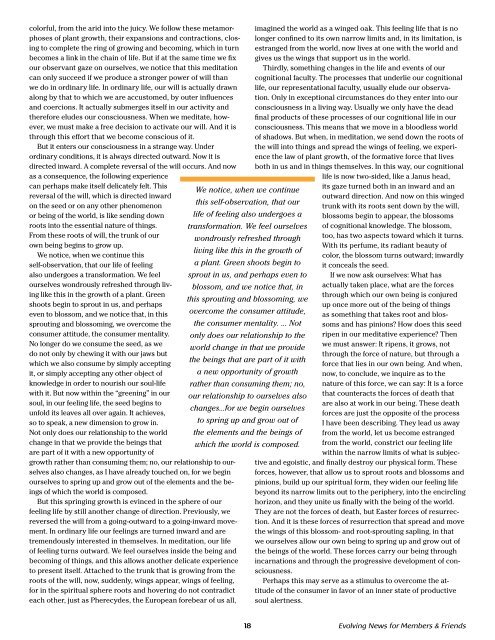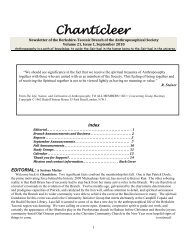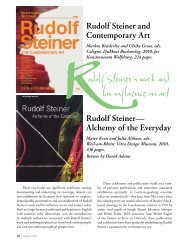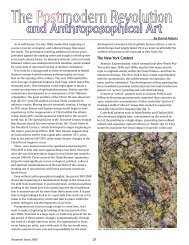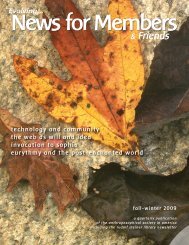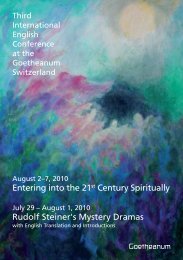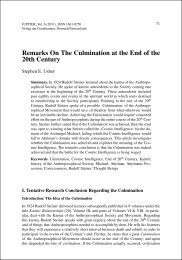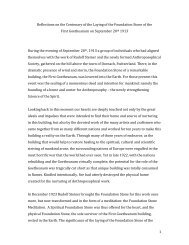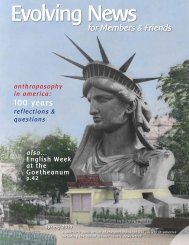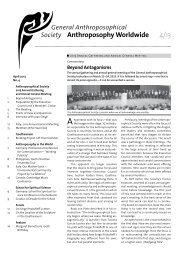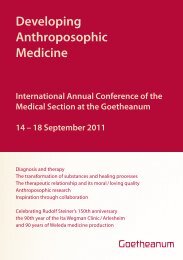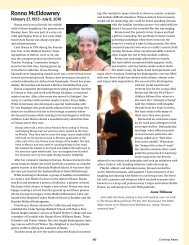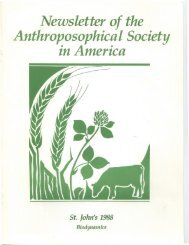Download - Anthroposophical Society in America
Download - Anthroposophical Society in America
Download - Anthroposophical Society in America
You also want an ePaper? Increase the reach of your titles
YUMPU automatically turns print PDFs into web optimized ePapers that Google loves.
colorful, from the arid <strong>in</strong>to the juicy. We follow these metamorphosesof plant growth, their expansions and contractions, clos<strong>in</strong>gto complete the r<strong>in</strong>g of grow<strong>in</strong>g and becom<strong>in</strong>g, which <strong>in</strong> turnbecomes a l<strong>in</strong>k <strong>in</strong> the cha<strong>in</strong> of life. But if at the same time we fixour observant gaze on ourselves, we notice that this meditationcan only succeed if we produce a stronger power of will thanwe do <strong>in</strong> ord<strong>in</strong>ary life. In ord<strong>in</strong>ary life, our will is actually drawnalong by that to which we are accustomed, by outer <strong>in</strong>fluencesand coercions. It actually submerges itself <strong>in</strong> our activity andtherefore eludes our consciousness. When we meditate, however,we must make a free decision to activate our will. And it isthrough this effort that we become conscious of it.But it enters our consciousness <strong>in</strong> a strange way. Underord<strong>in</strong>ary conditions, it is always directed outward. Now it isdirected <strong>in</strong>ward. A complete reversal of the will occurs. And nowas a consequence, the follow<strong>in</strong>g experiencecan perhaps make itself delicately felt. Thisreversal of the will, which is directed <strong>in</strong>wardon the seed or on any other phenomenonor be<strong>in</strong>g of the world, is like send<strong>in</strong>g downroots <strong>in</strong>to the essential nature of th<strong>in</strong>gs.From these roots of will, the trunk of ourown be<strong>in</strong>g beg<strong>in</strong>s to grow up.We notice, when we cont<strong>in</strong>ue thisself-observation, that our life of feel<strong>in</strong>galso undergoes a transformation. We feelourselves wondrously refreshed through liv<strong>in</strong>glike this <strong>in</strong> the growth of a plant. Greenshoots beg<strong>in</strong> to sprout <strong>in</strong> us, and perhapseven to blossom, and we notice that, <strong>in</strong> thissprout<strong>in</strong>g and blossom<strong>in</strong>g, we overcome theconsumer attitude, the consumer mentality.No longer do we consume the seed, as wedo not only by chew<strong>in</strong>g it with our jaws butwhich we also consume by simply accept<strong>in</strong>git, or simply accept<strong>in</strong>g any other object ofknowledge <strong>in</strong> order to nourish our soul-lifewith it. But now with<strong>in</strong> the “green<strong>in</strong>g” <strong>in</strong> oursoul, <strong>in</strong> our feel<strong>in</strong>g life, the seed beg<strong>in</strong>s tounfold its leaves all over aga<strong>in</strong>. It achieves,so to speak, a new dimension to grow <strong>in</strong>.Not only does our relationship to the worldchange <strong>in</strong> that we provide the be<strong>in</strong>gs thatare part of it with a new opportunity ofgrowth rather than consum<strong>in</strong>g them; no, our relationship to ourselvesalso changes, as I have already touched on, for we beg<strong>in</strong>ourselves to spr<strong>in</strong>g up and grow out of the elements and the be<strong>in</strong>gsof which the world is composed.But this spr<strong>in</strong>g<strong>in</strong>g growth is ev<strong>in</strong>ced <strong>in</strong> the sphere of ourfeel<strong>in</strong>g life by still another change of direction. Previously, wereversed the will from a go<strong>in</strong>g-outward to a go<strong>in</strong>g-<strong>in</strong>ward movement.In ord<strong>in</strong>ary life our feel<strong>in</strong>gs are turned <strong>in</strong>ward and aretremendously <strong>in</strong>terested <strong>in</strong> themselves. In meditation, our lifeof feel<strong>in</strong>g turns outward. We feel ourselves <strong>in</strong>side the be<strong>in</strong>g andbecom<strong>in</strong>g of th<strong>in</strong>gs, and this allows another delicate experienceto present itself. Attached to the trunk that is grow<strong>in</strong>g from theroots of the will, now, suddenly, w<strong>in</strong>gs appear, w<strong>in</strong>gs of feel<strong>in</strong>g,for <strong>in</strong> the spiritual sphere roots and hover<strong>in</strong>g do not contradicteach other, just as Pherecydes, the European forebear of us all,We notice, when we cont<strong>in</strong>uethis self-observation, that ourlife of feel<strong>in</strong>g also undergoes atransformation. We feel ourselveswondrously refreshed throughliv<strong>in</strong>g like this <strong>in</strong> the growth ofa plant. Green shoots beg<strong>in</strong> tosprout <strong>in</strong> us, and perhaps even toblossom, and we notice that, <strong>in</strong>this sprout<strong>in</strong>g and blossom<strong>in</strong>g, weovercome the consumer attitude,the consumer mentality. ... Notonly does our relationship to theworld change <strong>in</strong> that we providethe be<strong>in</strong>gs that are part of it witha new opportunity of growthrather than consum<strong>in</strong>g them; no,our relationship to ourselves alsochanges...for we beg<strong>in</strong> ourselvesto spr<strong>in</strong>g up and grow out ofthe elements and the be<strong>in</strong>gs ofwhich the world is composed.imag<strong>in</strong>ed the world as a w<strong>in</strong>ged oak. This feel<strong>in</strong>g life that is nolonger conf<strong>in</strong>ed to its own narrow limits and, <strong>in</strong> its limitation, isestranged from the world, now lives at one with the world andgives us the w<strong>in</strong>gs that support us <strong>in</strong> the world.Thirdly, someth<strong>in</strong>g changes <strong>in</strong> the life and events of ourcognitional faculty. The processes that underlie our cognitionallife, our representational faculty, usually elude our observation.Only <strong>in</strong> exceptional circumstances do they enter <strong>in</strong>to ourconsciousness <strong>in</strong> a liv<strong>in</strong>g way. Usually we only have the deadf<strong>in</strong>al products of these processes of our cognitional life <strong>in</strong> ourconsciousness. This means that we move <strong>in</strong> a bloodless worldof shadows. But when, <strong>in</strong> meditation, we send down the roots ofthe will <strong>in</strong>to th<strong>in</strong>gs and spread the w<strong>in</strong>gs of feel<strong>in</strong>g, we experiencethe law of plant growth, of the formative force that livesboth <strong>in</strong> us and <strong>in</strong> th<strong>in</strong>gs themselves. In this way, our cognitionallife is now two-sided, like a Janus head,its gaze turned both <strong>in</strong> an <strong>in</strong>ward and anoutward direction. And now on this w<strong>in</strong>gedtrunk with its roots sent down by the will,blossoms beg<strong>in</strong> to appear, the blossomsof cognitional knowledge. The blossom,too, has two aspects toward which it turns.With its perfume, its radiant beauty ofcolor, the blossom turns outward; <strong>in</strong>wardlyit conceals the seed.If we now ask ourselves: What hasactually taken place, what are the forcesthrough which our own be<strong>in</strong>g is conjuredup once more out of the be<strong>in</strong>g of th<strong>in</strong>gsas someth<strong>in</strong>g that takes root and blossomsand has p<strong>in</strong>ions? How does this seedripen <strong>in</strong> our meditative experience? Thenwe must answer: It ripens, it grows, notthrough the force of nature, but through aforce that lies <strong>in</strong> our own be<strong>in</strong>g. And when,now, to conclude, we <strong>in</strong>quire as to thenature of this force, we can say: It is a forcethat counteracts the forces of death thatare also at work <strong>in</strong> our be<strong>in</strong>g. These deathforces are just the opposite of the processI have been describ<strong>in</strong>g. They lead us awayfrom the world, let us become estrangedfrom the world, constrict our feel<strong>in</strong>g lifewith<strong>in</strong> the narrow limits of what is subjectiveand egoistic, and f<strong>in</strong>ally destroy our physical form. Theseforces, however, that allow us to sprout roots and blossoms andp<strong>in</strong>ions, build up our spiritual form, they widen our feel<strong>in</strong>g lifebeyond its narrow limits out to the periphery, <strong>in</strong>to the encircl<strong>in</strong>ghorizon, and they unite us f<strong>in</strong>ally with the be<strong>in</strong>g of the world.They are not the forces of death, but Easter forces of resurrection.And it is these forces of resurrection that spread and movethe w<strong>in</strong>gs of this blossom- and root-sprout<strong>in</strong>g sapl<strong>in</strong>g, <strong>in</strong> thatwe ourselves allow our own be<strong>in</strong>g to spr<strong>in</strong>g up and grow out ofthe be<strong>in</strong>gs of the world. These forces carry our be<strong>in</strong>g through<strong>in</strong>carnations and through the progressive development of consciousness.Perhaps this may serve as a stimulus to overcome the attitudeof the consumer <strong>in</strong> favor of an <strong>in</strong>ner state of productivesoul alertness.18 Evolv<strong>in</strong>g News for Members & Friends


